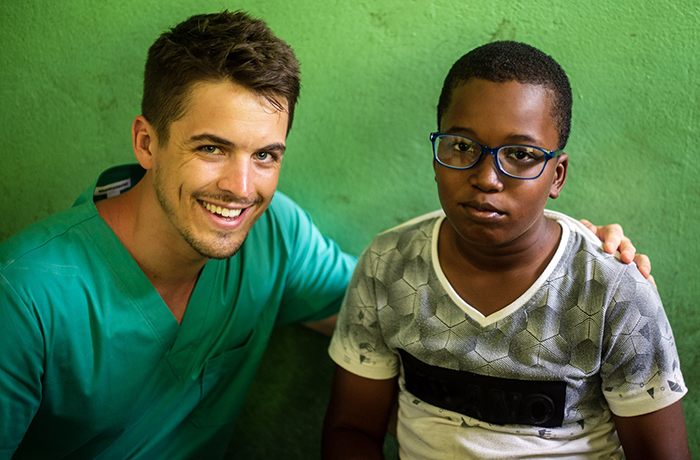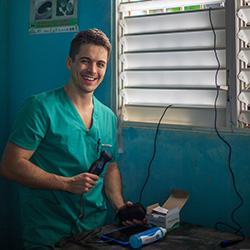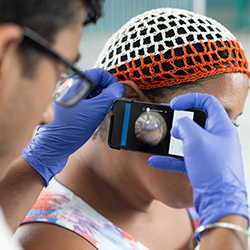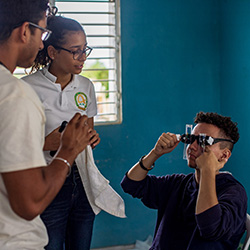
Bringing Diagnostic Tools to Rural Villages

A second-year medical student at the University of Arizona College of Medicine – Phoenix is changing diagnostic care for patients in rural villages in the Dominican Republic.

The smartphone-based diagnostic tools used in this year’s global health trip included a point-of-care ultrasound, retinal camera, digital otoscope and mobile EKG, visual acuity check with simulation and high-definition dermascope. This is the first-time students used these tools in the rural Dominican Republic bateys.
“Global health physicians and medical students have the opportunity to provide care to patients who are often hesitant to seek medical care or don’t have access to care,” said David Beyda, MD, director of the college’s Global Health Program. “By using these smartphone diagnostic tools like Scott implemented in the Dominican Republic, physicians can make quick bedside diagnostics that will improve the treatment and quality of care for patients in rural, international areas.”

“On our trip, we evaluated smartphone-based diagnostic tools that might improve diagnosis and screening for patients that otherwise would not have access to clinical or surgical care,” Litton said. “These tools proved to be valuable assets in the clinic and helped us provide better quality care to our patients.”
Prior to the student’s trip to the Dominican Republic, Teresa Wu, MD, director the Emergency Ultrasound Program and Fellowship and director of the Simulation Curriculum at the college, taught medical students point-of-care ultrasound since exposure to this technology is not part of the first-year curriculum. On the trip, Litton conducted 76 surveys to analyze acceptance of the smartphone diagnostic tools among patients and students.
“As an ophthalmologist, I always say that ‘vision is more than eyesight,’ ” said Robin Ross, MD, MPH, director of Global Outreach at the college and a volunteer physician on the Dominican Republic trip. “Our ultimate vision is improved health care for all and in global health, it is often improving the health of the poorest in low-income countries. As a surgeon, I recognize that 9 out of 10 people living in low-income countries lack access to surgical care. We believe in taking the best advances we have in medicine and making them portable. Next, we need to figure out if they work and are accepted by the local population. Scott has taken this idea and made it the basis of his scholarly project.”
Litton became interested in the project because of his global health experiences prior to medical school, which included excursions in Central and South America. He said the trip to the Dominican Republic was a great experience and he was honored to serve the people who live there.

If you are interested in donating and supporting medical students on future trips to the Dominican Republic, please visit the UA Foundation page and specify under the comments that you’d like the proceeds to go to the Global Health Interest Group.
About the College
Founded in 2007, the University of Arizona College of Medicine – Phoenix inspires and trains exemplary physicians, scientists and leaders to advance its core missions in education, research, clinical care and service to communities across Arizona. The college’s strength lies in our collaborations and partnerships with clinical affiliates, community organizations and industry sponsors. With our primary affiliate, Banner Health, we are recognized as the premier academic medical center in Phoenix. As an anchor institution of the Phoenix Bioscience Core, the college is home to signature research programs in neurosciences, cardiopulmonary diseases, immunology, informatics and metabolism. These focus areas uniquely position us to drive biomedical research and bolster economic development in the region.
As an urban institution with strong roots in rural and tribal health, the college has graduated more than 1,000 physicians and matriculates 130 students each year. Greater than 60% of matriculating students are from Arizona and many continue training at our GME sponsored residency programs, ultimately pursuing local academic and community-based opportunities. While our traditional four-year program continues to thrive, we will launch our recently approved accelerated three-year medical student curriculum with exclusive focus on primary care. This program is designed to further enhance workforce retention needs across Arizona.
The college has embarked on our strategic plan for 2025 to 2030. Learn more.